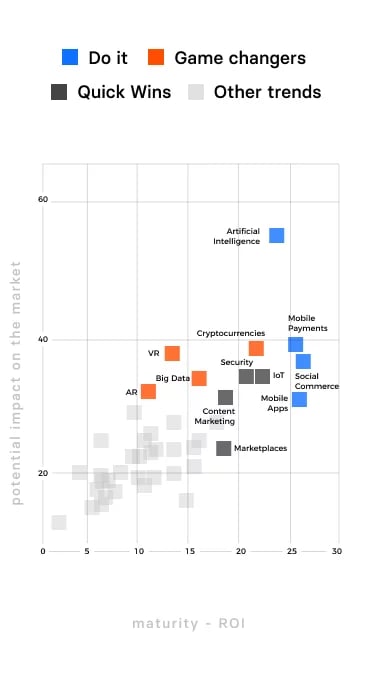-

RESPONDENTS
-

TRENDS
-

EXPERTS
The eCommerce Trends 2020 report is the most comprehensive guide through emerging technologies in the world of online sales. It is based on the extensive research, run by Divante and Kantar, among over 250 eCommerce experts representing 8 countries. The report is complemented with trends rankings, implementation examples, and opinions from 20 independent experts.
Key learnings
-

GOING MOBILE FOR HIGHER CR
Multiple mobile-related trends moved to key positions in the ranks. User demand for mobile-first solutions is high and brands are using modern mobile apps, social media and payments to improve conversion rates.
-

THE FUTURE LIES IN AI
Artificial Intelligence is the No.1 trend for future eCommerce. Widely used in other fields, from AR to IoT, Artificial Intelligence supports brands in understanding data and delivering customers highly-related suggestions.
-

SECURITY IS AT STAKE
Companies are pushing new solutions to market but numerous security concerns arise - many of which will only be revealed in the long term. The global approach to data security must be rethought.
-

ASIA SETS THE NEW STANDARD
Asian markets outgrew many legacy technologies and are now focused on the development of emerging technologies, like cryptocurrencies, AI, chatbots, and moving perception of online sales and customer behaviors to the next level.
-

TECHNOLOGY NATIVES WIN
Companies with digital technologies in their DNA win globally. Quick adoption of new solutions to the changing needs of customers allows them to spot niches and deliver new value.
Key numbers
-
66% of surveyed eCommerce experts from the UK implement trending technologies with regular in-house teams.
-
59% of eCommerce experts from Brazil have dedicated teams looking for trends.
-
31% of eCommerce managers believe that Artificial Intelligence is the trend that will have the most significant impact on the future of eCommerce.
-
20% of eCommerce experts declared their intention to invest in social commerce in 2020.
-
33% of surveyed eCommerce experts identified mobile payments, mobile apps, and security as the most important investments in 2019.

"Insight into the Chinese market offers essential understanding, not just of the current opportunities but also as a best practice for other digitally-developing markets."
Iris Chan, Partner at DLG (Digital Luxury Group)
eCommerce trends matrix

TRENDS OVERVIEW
DO IT
-

Artificial Intelligence (AI)
Gartner predicts that, in 2020, 85% of customer interactions are managed without human involvement. It's a trend that has moved at rapid speed.
Read moreAI is present in almost every area of eCommerce from recommendation engines and hyper-personalization to visual search. Based in big data and empowered machine learning, AI lets us make recommendations based on actual user behaviors, often in real-time. As the example of Netflix or Amazon shows, enabling Artificial Intelligence is a great way to serve users the exact content and products they are looking for.
In connection with mobile devices and personal assistants, AI makes a powerful tool for shoppers. Finding products by visual search or making orders via voice assistants becomes hassle-free.
In the years to come, we will therefore observe a massive growth in the global artificial intelligence market.EXPERT'S COMMENT
"As the technology matures, AI will help retailers deliver an even better and more seamless omnichannel experience with IoT; enhance search with visual, conversational, and guided product discovery; and offer adaptive, device-responsive, and dynamic outreach."
Lihi Pinto Fryman CMO and Co-Founder at Syte -

Social commerce
This year, social network penetration stood at 45% globally. An average user spends 142 minutes daily on social media. This is the time in which they ...
Read more... mainly socialize with their network; however, users also discover new products and follow their favorite brands, which makes it an ideal opportunity to sell products. For a long time, companies were using paid ads or content to attract users and transfer them to external transaction pages. But why should they convert them at all?
Social media providers also saw this opportunity, and after Facebook Marketplace (which is used by 800 million users in 70 countries), Instagram and Snapchat also enabled eCommerce features directly on their platforms and held customers in one platform. In the US, over one-third of adults shop through social media. In Asia, WeChat has the leading position, and 92 percent of the sellers in Asia believe social commerce is vital to their business growth.
Last year, we hit over 2.65 billion social media users worldwide, a number projected to increase to almost 3.1 billion in 2021. We can expect more social media providers to enable shopping directly on their platforms.EXPERT'S COMMENT
"The essence of social commerce is the immediacy of peer to peer sharing and traffic generation. It allows things to go viral."
Ashley Dudarenok, founder of Alarice & ChoZan -

Mobile Apps
In 2018, users downloaded mobile apps 194 billion times. Shopping apps are in the top 10 most downloaded apps on both Google Play and iOS, but it is worth mentioning that other app categories also offer paid products and services.
Read moreThanks to integrated payment systems and biosecurity features, shopping in mobile apps became seamless both in physical and virtual spaces.
In spite of this, it is difficult to gain commercial success as apps are often abandoned, need updates, and aren't 100% synchronized with the online offers of stores. The development and maintenance of native apps is also rather expensive (inlc. fees for iOS and Android). Progressive Web Apps solve most of these problems.EXPERT'S COMMENT
"We have found that if brands provide customers with experiences that entice them to come back to do business, they are actually far more likely to download the native mobile app."
Conor McGann, Google -

Mobile Payments
As mobile technologies are maturing, users are more keen to trust in payments operated by mobile devices. According to Global Webindex, 37% of global internet users pay for goods or services with their mobile phones each month.
Read moreThese numbers are significantly higher in Asia, where mobile payments are the primary payment method.
In Europe, the Payment Services Directive (aka PSD2), sets rules to prevent fraud and increase the transparency of mobile transactions but, at the same time, makes the payments more complicated.
Apple Pay and Android Pay are the exception and are an easy-to-use choice for many customers. Apple Pay, Samsung Pay, Android Pay and PayPal are the most popular mobile wallets in the western world. Retailers, like Walmart or Starbucks, also offer separate mobile wallets.
Asian customers pick GrabPay, WeChat Pay, Line Pay or Alipay which are now ubiquitous.EXPERT'S COMMENT
“While concerns around the security of mobile payments continue, we are seeing an increase in the use of and acceptance of mobile payments."
James Hickson, Founder & CEO at Bloom Financial Group
QUICK WINS
-

Security
Security should be one of the most important issues for eCommerce. Adoption of emerging technologies, like IoT, AI, and machine learning, is creating a larger attack surface and more frequent data breaches.
Read moreAttention must also be paid to data privacy.
Although GDPR, launched last year, forced many companies to invest in improvement and clarity of customer privacy and security, more than 42% of internet users still believe that their data is being misused online. As we heard on the Google I/O conference: Privacy is dead... but we’re ok.
Online sellers should consider a change of approach from open to closed, from op-out to opt-in.
Customers are more and more keen to use biometric verification (fingerprint and face scanners) but many of them are still stuck in two-factor authentication or physical payment tools (credit cards). We see that face-scanning fraud tests and a debate on the security of biometric data is still ongoing.
On the other hand, eCommerce platforms provided multiple tools to monitor safety and ensure a high level of security in their online stores.EXPERT'S COMMENT
"Companies have realized that customers are becoming more privacy-conscious. Tighter data control and legal compliance are crucial in industries that handle sensitive data and in eCommerce where clients’ information - payment details, transactions, addresses - is processed."
Maciej Zawadziński, CEO at Piwik PRO -

Internet of Things
We've been waiting for something big. In the meantime, the network of small devices, known as IoT, has taken the world by storm—especially on the business side.
Read moreThis year, the Internet of Things played a role in the successes of stores owned by the largest fashion brands in the world. Brick-and-mortar stores of the Inditex Group or LPP are equipped with RFID technology that allows retailers to track the location of products in stores, choose matching accessories or automate delivery processes for products ordered online. For many retailers, IoT is becoming an important part of their digital strategies.
But the revolution is also happening in customers’ homes where home appliances connect with the Internet, enriching the user experience, and more and more often, this leads to online shopping.
The next big step for the IoT is still ahead of us. Along with 5G, the IoT will have better connectivity and thus more devices will be able to connect and work together seamlessly.EXPERT'S COMMENT
“Digital transformation shows us that everything that can be digitized will eventually be digitized. Surprisingly, one of the most important areas of digitalization was so far not in focus: our homes."
Christian Hartmann, Residential IoT Lead at Bosch Power Tools -

Content Marketing
Content marketing is one of the most stable trends on our list. High quality, engaging content is the best way to attract customers, and so short video formats and cooperation with influencers were the most successful strategies in the past year.
Read moreAnother reason would be the usage of ad-blocking tools by almost half of internet users. Content must be displayed where customers are naturally viewing the web.
As we observe a shift towards private digital spaces, we need to think of new content forms that create important, interesting and timely relations with users, rather than filling endless content calendars.EXPERT'S COMMENT
“Today, Content Marketing in eCommerce is just as crucial as free delivery or online payments. Accurate product descriptions, the right keywords, personalized ads and content meeting precisely the recipients needs is essential for driving eCommerce traffic and sales."
Jakub Strzelczyk, eCommerce Director Central Europe at Lacoste -

Selling and Advertising on Marketplaces
Online marketplaces are still the favorite space of online sellers to reach an extensive, ready-to-buy customer base, while keeping the costs of payment and shipment processes low.
Read moreIn Q2 2019, over 54% of products sold at Amazon were offered by third-party sellers. Amazon and Alibaba are the largest global marketplaces, but smaller marketplaces are gaining popularity in local markets. In 2018, more than 50% of eCommerce sales globally were made through marketplaces, and this number will grow to about two-thirds within five years, especially since they strongly support cross-border exchange of goods. Marketplaces are convenient both for customers and sellers.
Due to the immense scale and budget, marketplace owners are those who are driving innovations first. Amazon, Alibaba, and Aliexpress are testing out new concepts and technologies like SuperApp, face-recognition based payments, drone delivery or even sales models mixed with brick-and-mortar shops.EXPERT'S COMMENT
"Compared with other retail channels, marketplaces offer an increasingly compelling proposition for shoppers: a wide assortment, competitive pricing, and often additional comfort and security of the marketplace facilitator who offers customer service and delivery guarantees."
Kiri Masters, Founder at Bobsled Marketing
GAME CHANGERS
-

Cryptocurrencies
Today, 5.5% of internet users declare owning some form of cryptocurrency. This might not be a lot, but looking at the speed of cryptocurrency development is an important factor...
Read more... especially in regions with low stability of state-regulated currencies or where cryptocurrencies are considered to be the national currency (like in China).
For now, South Africa, Thailand, Indonesia, Vietnam, and Brazil are taking leading positions in the usage of cryptocurrencies.
Despite the constantly changing valuation of cryptocurrencies, Mastercard, PayU, and PayPal are making serious investments in this branch of payment methods, but instead of bitcoins, they are working on stable coins. This could be a real alternative for over 1.7 billion users across the world who don’t have any access to banking services. One such attempt is the Libra project, a global payment solution based on an open-source blockchain, that has engaged companies like Facebook, Uber, and Spotify, as well as some non-profit organizations. The launch of this project is planned for 2020.EXPERT'S COMMENT
"I believe the real innovation here is the technological revolution behind distributed ledgers and blockchain design of which cryptocurrencies are only one potential branch."
Robert Kałuża, Co-founder and Chief Operating Officer at Billion group (PN) -

Big Data
Big Data is continuously at the top of the trend rankings. It lies at the heart of every digital transformation, and it is a gateway to more advanced technologies like AI or machine learning.
Read moreFast-growing mobile data traffic, cloud computing traffic, and the rapid development of trending technologies such as artificial intelligence (AI) and the Internet of Things (IoT) will all contribute to the increasing volume and complexity of data sets. And the launch of 5G is ahead of us, which will result in more interconnectivity and data sharing than ever before.
Advanced analytics tools, such as predictive analytics and data mining, will let eCommerce companies extract high-quality data to better understand their business and user needs. New data sources and improvements in data literacy levels will lead to the generation of new business insights.EXPERT'S COMMENT
"Apparently, data management is hard. It is even harder when combined with data governance, and the latter is becoming more important in the days of GDPR and similar regulations."
Rafał Małanij, Chairperson at PyData WarsawGlobal retailers, like Prada, get a better understanding of gathered data and leverage it in the processes of digital transformations as well as further business development. They are strongly backed by software and eCommerce platform providers.
-

Virtual Reality
Virtual reality is a great for product discovery over a large distance, but the barriers to VR adoption are still blocking many customers from enjoying this technology in full.
Read moreThere are approximately 171 million VR users globally.
So far, only a few brands, IKEA, Wayfair and Lowe's among them, have decided to display their products in virtual reality and allow their users to move them around spaces filled with their products and get the feeling of having them in real life. VR is used similarly in the real estate sector.
Brands also use Virtual Reality to deliver unique in-store shopping experiences and present customers with promotional content and games or engage them in loyalty programs. Similar VR content can be displayed via social media platforms, like YouTube, to customers with their own VR headsets.
Virtual Reality is expected to flourish with 5G.EXPERT'S COMMENT
"Today’s online shopping tends to the gamification of interactions with customers, and VR is a part of this process. This technology allows developing solutions that let customers interact with their beloved brands on a whole new level - a gamified shopping experience."
Dana Kachan, marketing consultant for eCommerce brands -

Augmented Reality
Gartner estimates that 100 million customers have already bought products with the use of augmented reality. This includes online and in-store AI experiences.
Read moreThe accessibility of AR will grow with the full launch of 5G.
According to Mobile Marketer, 63% of retail brands have used augmented reality (AR) to date. So far, we've seen the massive explosion of AR-powered virtual try-on of shoes, glasses, and make-up. Nike, Converse and other retailers were followed by social media, including Instagram and Snapchat, which enabled AR in their filters. Combined with tests of eCommerce features, this gives an engaging and powerful tool for social commerce.
Customers don't rely on AR when making purchase decisions, but over 50% of them admit that AR makes shopping fun!EXPERT'S COMMENT
"Augmented Reality tops the lists of technologies that make consumers think a brand is innovative, with many consumers wanting to see these technologies improve their shopping experiences. In the next 3-5 years we will see Augmented reality hardware shift from smartphone and expensive bulky developer headsets to affordable light standalone glasses that people can wear all day."
Rob Crasco, co-owner at CyberAdept
ECOMMERCE EXPERTS
Meet the eCommerce Trends report's experts
-

James Hickson
Founder & CEO of Bloom, as well as a FinTech passionate about the future, grounded in 15 years of international experience on Wall St.
-

Karolyn Hart
An award-winning Canadian entrepreneur, technology executive, activist, speaker, author and Founder of InspireHUB.
-

Maciej Zawadziński
Expert in analytics and advertising technologies, technology enthusiast and entrepreneur. CEO at Piwik PRO, GDPR-compliant analytics platform, and Clearcode.
-

Christian Hartmann
Residential IoT Lead at Bosch Power Tools, expert in digitalization of automotive, public, and consumer industries. Focuses on supply chain optimization with industry 4.0 solutions, eGoverment service platforms and eCommerce with dedication on sales and marketing.
-

Robert Kaluza
Co-founder and Chief Operating Officer at Billon. Expert in transforming businesses from concept to reality, blockchain technology, and on the banking sector.
-

Konrad Zach
Head of eCommerce at OEX24.com marketplace, an expert with over 15 years of building B2B and B2C eCommerce platforms.
-

Sascha Stockem
CEO & Founder of Nethansa, a dynamically growing startup offering sales increasing services on Amazon. It facilitates the process of entering foreign markets via Amazon as well as manages all sales and marketing operations on the marketplace.
-

Jakub Strzelczyk
Director of eCommerce CE Lacoste. Expert with 14 years of globally gained experience, passionate about new solutions and technologies helping in online sales.
-

Dana Kachan
Marketing consultant with extensive experience in providing digital marketing solutions for eCommerce brands, AR/VR development companies, product design, and software development houses in Singapore, USA, and Europe.
-

Rafał Małanij
Chairperson at PyData Warsaw. Tech enthusiast who is always amazed by data and what insights we can get out of it. Currently involved in Data analytics and Cloud projects.

„eCommerce will change radically in the next few years and only companies that are strategically and technically prepared for these changes will be able to keep pace. The eCommerce Trends 2020 report has clearly summarized the most important initiatives and directions and provides a steep template for all eCommerce managers and CEOs to focus on the most promising topics. A must-read for those at home in eCommerce.“
Stefan Hamann, Founder & CEO of Shopware
WHAT'S MORE?
Also in the eCommerce Trends report
-

5G AND ECOMMERCE
-

MOBILE FOR EVERYONE
-

VOICE COMMERCE
-

LEADERS OF CHANGE
-

WORKING WITH TRENDS

"Talking about trends sometimes feels like buzzword-bingo. This report, however, shows the most vital eCommerce trends in detail with relevant statistics, expert opinions and best practice examples. As a content-focussed AI company, we’re pleased to see these two topics remain top priorities in 2020."
Franz Riedl, Founder and COO at Styla
AUTHORS
-

Divante is an expert in providing top-notch eCommerce solutions and products for both B2B and B2C segments. By supporting its clients in sales growth, Divante defines completely novel ideas, implements the latest technologies, and delivers an unprecedented user experience.
-

Kantar is home to some of the world's leading research, data, and insights expertise. Collectively, Kantar's 30,000 employees offer a complete view of consumers – the way they think, feel, shop, share, vote, and view – in over a hundred countries worldwide.









